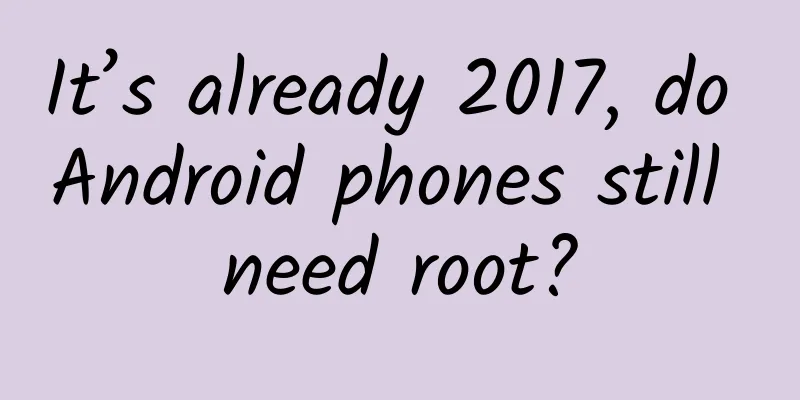It’s already 2017, do Android phones still need root?

|
Android is the most popular operating system in the world, and devices based on this system are in a dominant position worldwide. However, for many Android phone users, the word root is very unfamiliar to them, and even a thing of the past. However, as early as 2014, data showed that as many as 80% of Android users chose to root their smartphones, and only 6% did not know what the word root meant. Many mobile phone users know that mobile phone manufacturers usually warn against rooting mobile phones, because once the mobile phone is rooted, the warranty will no longer be provided, and all subsequent responsibilities will be borne by the user. But in those years, rooting Android phones was equivalent to opening up a whole new world. More potential will be tapped, and users can control everything and do various things that were not possible before. Therefore, a large number of users have joined the root army and believe that rooting the mobile phone is an indispensable step. So, what are the benefits of rooting your phone? Why did so many people choose rooting in the past, but rooting is no longer so popular today? What can I do after Rooting? In those years, a rooted Android phone could do a lot of things. It is basically accurate to say that it can control everything. If broken down, it can be divided into the following points:
This is almost the top priority for most Android phone users, because after rooting, you can fully control the apps installed on the phone with administrator privileges. You don't need to endure the messy apps pre-installed by the manufacturer, especially the "family bucket" type of apps, which reduces storage space and background usage, making the system less bloated and reducing jams. Of course, not all apps can be deleted as you want. This operation used to have a comparison list in the forum to tell you which apps to delete without affecting the normal use of the phone. Titanium Backup was very popular back then and was the best choice for deleting or freezing apps.
Many manufacturers have backup tools that can back up some key data, including settings and applications, but that is not a complete backup. Some manufacturers even only back up the list of settings changed or apps downloaded by the phone. Therefore, before the real cloud backup came out, rooting and then using Titanium Backup to completely back up the phone was also one of the most popular operations at the time. Any data can be easily and completely backed up and restored. Of course, there are also operations to back up and restore through third-party Recovery, but sometimes it is easy to have boot errors or fail to enter the desktop normally.
It can be said that there are still many users who cannot stand the fact that the official or operator no longer provides updates, so they have to choose root and flash the ROM firmware from the public. After all, mainstream manufacturers only provide continuous upgrades for one or two popular models, but the time will not be too long, not to mention the phones sold by operators. It is almost impossible to achieve the update speed of Google's own mobile phones. However, third-party ROMs cannot compare with the official stability, and some functions may not be realized due to compatibility issues.
After playing with streamlined systems, and then system backups, and also knowing how to flash third-party folk ROMs to get upgrades, custom ROMs are basically the only way to go. Flashing is the most common word among Chinese people. In the past, people often joked, "Have you flashed? Which one did you flash?" Because there were too many people who were dissatisfied with the official system, and third-party custom ROMs provided features that the official system did not have, such as deep customization, beautification or simplification, and provided many practical personalized functions, or better battery life experience. Therefore, many mobile phone users are deeply attracted by third-party custom ROMs and follow them uncontrollably, such as MIUI back then.
Many users pursue the former of these two functions. After rooting, there is not only a file manager, but also a rich theme management function, font change, skin change, which old users often play with. After all, they pursued the feeling of opening the screen to make people's eyes shine and showing off their desktop to make people envious. As for overclocking, fewer users play with it after rooting, but it is not absent, especially users who want to play games like today's "high frame rate mode". However, excessive use of the processor will inevitably consume alarming power, so many users also use this method to reduce the frequency to ensure the battery life of the machine. Why is root no longer popular? There are many other things you can do after rooting, but "flashing" must be one of the biggest reasons for rooting. Basically, you don't need to be proficient in mobile phones. You can flash excellent custom ROMs by following the tutorials, not to mention the more fool-proof flashing tools such as Flash Wizard. With a third-party ROM, you can realize features such as setting option search, do not disturb mode, split screen display, various lock screen operations, etc. You should know that a unique status bar could make people excited for the whole day. However, the era of rooting is over, which has led to fewer and fewer users choosing to root their devices. The key reason for this is that the increasingly excellent original Android experience has been continuously integrated into the functions of custom ROMs and even OEM manufacturers' UIs, from the early notification center quick settings to theme customization, power saving mode and detailed permission management, as well as multi-tasking and multi-window processing, leaving less and less space for custom ROMs. In addition to the better basic Android core experience, the key is that the official ROMs of local mobile phone manufacturers are becoming more and more user-friendly, with their own complete cloud services and backup services, and all the functions you want after a large number of root, including theme customization, and integrating the most localized services and experiences, forming a powerful ecosystem that makes users want to use it more and more. There are even some manufacturers who advocate a 500-day non-lag experience, which I don't know whether it is true or not. At the same time, in terms of system updates, due to increasingly fierce competition in the domestic market, the speed of system updates has also become one of the most important aspects for manufacturers. Whether it is Xiaomi, Huawei or Meizu, they have begun to work hard on the speed and frequency of mobile phone upgrades, and use this as a selling point. Therefore, in the past two years, there have been fewer voices urging manufacturers to update. At least in terms of update speed, they are not inferior to or even faster than international brands, which also gives users full confidence. In addition, there is one last important reason. There are more and more incidents of personal privacy data (contacts, photos, videos, etc.) being leaked due to malware tools caused by root. For example, the 315 report on the hacking of public charging piles and the hacking of free public Wi-Fi. Now more and more users have realized the risks brought by root and no longer insist on choosing root operations. So, would you root your phone today? Of course, there is another reason why mobile phones are no longer rooted. That is, manufacturers are locking their phones more and more strictly. For example, if they do not provide bootloader unlocking and cannot flash ROM, rooting is meaningless. The point is that due to the lack of official support, many phones cannot use certain functions after rooting, especially fingerprint recognition, iris recognition, phone search, system updates and related value-added services. But at this point, the root craze has subsided. Is this operation really no longer suitable today? This is not the case. The simplest reason is that the Android camp is still going its own way, fragmentation has not changed, and different pursuits still exist, so rooting will definitely not be eliminated. For example, MIUI and Flyme, which are very famous in China, some Flyme users feel that their phones have many bugs. Seeing that MIUI is highly customizable and playable, they hope to flash MIUI on their phones after rooting. MIUI users think that their own system is bloated and has many ads, so they choose rooting to simplify it or flash Flyme. Obviously, because each Android has its own advantages and features, the fundamental purpose of users choosing root has not changed, and root will not die, because not every user pursues the official experience. But in any case, today fewer and fewer users choose root. The final question is, if you are using an Android phone, will you still choose root? |
<<: Half a year later, the truth about mini programs
>>: How JD.com handles the impact of data center networks on application performance
Recommend
How did the first feathers grow?
Friends who don't usually pay attention to di...
Lanzhou SEO training: Summarize the writing methods and precautions of website SEO optimization titles
In website optimization, title SEO optimization i...
After being hypnotized, can people really do whatever they are told to do? Don't be fooled by movies and TV shows
Author: ACC Psychology Popular Science Author Rev...
TrendForce: In April 2023, the average price of battery-grade lithium carbonate in China fell to RMB 198,000 per ton, a monthly drop of 39%.
According to TrendForce's official WeChat acc...
Why do the holidays go by so fast?
Author: The Nutcracker Studio Many people have th...
A complete analysis of the private domain operations of top brands’ WeChat accounts
In previous cases, we mentioned educational insti...
There is a lot of sand on the earth, and there are even more stars in the universe. How many galaxies are there in the universe?
How much sand is there on Earth? This is a questi...
2019 Spring Festival Mobile App Market Insight Report!
1. In the past 30 days, the amount of material re...
14 top development communities frequented by foreign programmers
[[146603]] Let's take a look at the 14 top de...
Is the customization cost of Changsha Photo Mini Program high? Changsha photo app customization cost and process
The launch of mini programs has brought convenien...
What are the dangers of ethylene glycol explosion?
Recently, everyone must have seen the news of a f...
A Century of Advertising and Marketing
On the day JWT was merged with digital marketing ...
JD Cloud Wireless Bao Baili Review: A 600-yuan router that is fast, stable, and profitable
There are so many AX6000 series routers on the ma...
Financial APP, how to open source for users
Today, the financial APP market has reached a rel...









